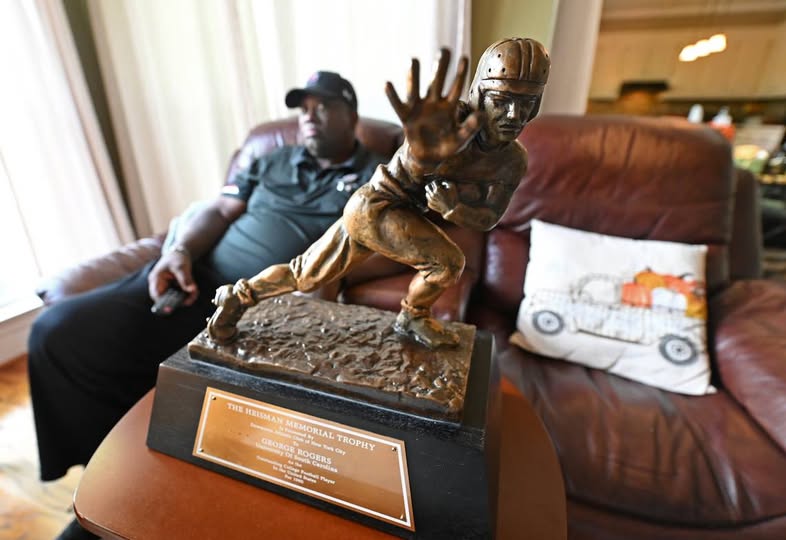George Rogers, a South Carolina Gamecocks legend, has recently been named as the Greatest of All Time in College Football by ESPN, defeating legendary Georgia Bulldog Herschel Walker in a contest that has sparked significant debate and excitement among football fans. This decision is not just a recognition of Rogers’ excellence as a player but also an acknowledgment of the impact he had on the college football landscape, particularly within the Southeastern Conference (SEC). His journey to this prestigious title has been filled with milestones, both individual and team-related, that have solidified his place in college football history.
Born on April 8, 1961, in Georgetown, South Carolina, George Rogers’ journey to football greatness began at an early age. Growing up in a football-centric region, he was exposed to the sport’s culture early on and developed a passion for it. His talent quickly became evident during his high school years, where he showcased an incredible ability to run the ball with power, vision, and speed. It wasn’t long before college scouts began taking notice, and Rogers eventually committed to play for the South Carolina Gamecocks in 1979.
At South Carolina, Rogers wasted no time making his presence known. As a freshman, he immediately became one of the most dynamic players in the SEC, with his combination of size, strength, and agility giving him an advantage over many defenders. He finished his first season with over 1,000 rushing yards, an impressive feat for any freshman, and set the stage for what would become one of the most dominant careers in college football history. Throughout his four years in Columbia, Rogers continued to develop his game, refining his skills and becoming a leader for his team. He was known for his work ethic, his commitment to improving, and his unwavering desire to win.
Rogers’ most significant achievement came during his senior year in 1980, when he won the prestigious Heisman Trophy. This award, given to the best player in college football, was a crowning moment in a season that saw Rogers put up staggering numbers. He rushed for over 1,600 yards and scored 14 touchdowns, leading South Carolina to a 6-5 record, which was a remarkable achievement for the Gamecocks at the time. Rogers’ dominance on the field was undeniable, and his Heisman win was a testament to his incredible ability and work ethic.
However, it wasn’t just his individual accolades that made Rogers a legend in college football. His time at South Carolina also marked a significant turning point for the university’s football program. While the Gamecocks were not perennial powerhouses during Rogers’ tenure, his performance on the field helped elevate the team’s profile and set the stage for future success. Rogers’ impact was felt in the locker room, where he instilled a sense of confidence and pride in his teammates. His leadership and determination resonated beyond the football field, and his legacy at South Carolina continues to this day.
Rogers’ decision to turn professional after his Heisman-winning season led him to be selected by the New Orleans Saints as the first overall pick in the 1981 NFL Draft. While his professional career had its share of ups and downs, including playing for several teams over his career, it was in college football that Rogers truly left an indelible mark. His legacy at South Carolina is one that still resonates with the Gamecock faithful, and his contributions to the sport will be remembered for generations to come.
The selection of George Rogers as the Greatest of All Time in College Football by ESPN was the result of a broader discussion surrounding the best players in college football history. Herschel Walker, who played for the University of Georgia, was a strong contender for the title as well. Walker’s career in college football is legendary, and many would argue that his achievements rival those of Rogers. Walker was a dominant force for the Bulldogs, earning consensus All-American honors and winning the Heisman Trophy in 1982. His college football resume is filled with impressive statistics, including over 5,000 career rushing yards, and he led Georgia to a national championship in 1980.
Despite Walker’s numerous accomplishments, the debate ultimately boiled down to the impact that Rogers had on his team and the significance of his individual achievements. While both players were incredibly talented, Rogers’ Heisman Trophy win, coupled with his remarkable consistency and leadership, helped tip the scales in his favor. South Carolina, while not historically a powerhouse like Georgia, was able to compete at a high level due to Rogers’ exceptional play, and his individual performance stands out in a way that few players’ careers have.
Rogers’ selection also comes at a time when the sport of college football is undergoing significant changes. The game has evolved over the years, with new strategies, rules, and technologies changing the way the game is played. However, one constant has been the importance of great players who can elevate the level of competition and inspire others to greatness. George Rogers was one of those players. His impact on college football transcends statistics and records; it’s about the way he played the game, the energy he brought to the field, and the legacy he left for future generations of athletes.
The decision to crown George Rogers as the Greatest of All Time in College Football speaks volumes about the evolution of the game and how history will be shaped by the memories of those who have come before. The debate between Rogers and Walker is a testament to the greatness of both players, but it also underscores the importance of understanding the context in which these athletes played. Rogers’ achievements at South Carolina, combined with the challenges he faced during his career, make his recognition as the GOAT in college football particularly meaningful.
For many fans, George Rogers’ name will forever be synonymous with the Gamecocks and their football legacy. His Heisman win in 1980, his leadership on the field, and his impact on college football make him a player whose greatness will be remembered for years to come. Whether you were a fan of South Carolina, Georgia, or any other team, George Rogers’ story is one of perseverance, talent, and excellence. In the end, ESPN’s recognition of Rogers as the Greatest of All Time in College Football is not just about individual accomplishments, but about the enduring spirit of the sport itself. It’s about the athletes who have shaped the game, the fans who have supported them, and the lasting memories that they have left behind.
In conclusion, George Rogers’ selection as the Greatest of All Time in College Football is a fitting recognition of his incredible career and lasting impact on the sport. His achievements at South Carolina, highlighted by his Heisman Trophy win, set a standard of excellence that few have ever matched. While the debate with Herschel Walker is understandable, Rogers’ legacy stands as a testament to the power of individual greatness in shaping the history of college football. His name will forever be remembered as one of the game’s true legends, and his story will continue to inspire future generations of football players and fans alike.



